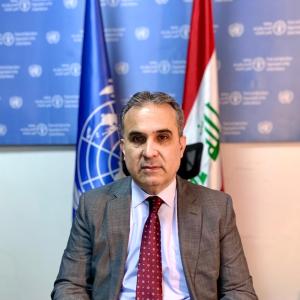EU Delegation Visits Southern Iraq to Witness the Progress in Climate-Smart Agriculture Applications and the Improvement of Farmers’ Livelihoods
21 January 2025
Basra, 20 January 2025 - The FAO-EU-funded project entitled “Restoration and Strengthening the Resilience of Agri-food Systems in Southern Iraq” is being implemented in collaboration with the Ministry of Agriculture (MoA) and local partners. This initiative aims to support smallholder farmers and communities in adapting to climate challenges while improving agricultural productivity and livelihoods.

A delegation from the European Union (EU), comprising Mr. David Healy, Deputy Head of Delegation and Chargé d’Affaires, and Dr. Lennart Deridder, EU Head of Cooperation in Iraq, visited project sites in Basra and Thi-Qar Governorates. The visit aimed to assess the progress of ongoing initiatives and highlight their impact on enhancing resilience and sustainability in the region's agri-food systems, particularly focusing on livestock, dairy production, tomatoes, and dates.
The FAO-EU funded project, addresses key challenges faced by smallholder farmers in southern Iraq by introducing agricultural practices aimed at mitigating the impacts of climate change and improving water use efficiency at the farm level. During the visit, the delegation engaged with farmers, women dairy producers, and local officials, observing the progress made in advancing agricultural practices, and marketing.
The visit included:
- Rural Dairy Centers for Milk Collection, Cooling, Processing, and Marketing:
The delegation visited one of the 45 rehabilitated centers across the three targeted governorates. These centers should support 300 women groups,
- Cultivation of New Fodder Crops:
The delegation visited sites where new fodder crops have been introduced by the project as part of an integrated package for sustainable farming.
- Developing Tomato and Date Palm Value Chains:
The delegation witnessed the advancements achieved in these value chains on production, quality, post-harvest handling, and marketig.
Utilizing Clean Energy for Marshland Water Desalination:
The delegation visited a solar-powered household water desalination unit in Halab, located in the marshlands of Al-Chibayish. Designed by FAO experts, this unit uses solar panels to generate electricity and operate the household desalination system, ensuring clean and sustainable energy production. These solutions aim to empower families to thrive in place, helping them overcome the challenges posed by harsh environmental conditions, reduces the household workload for women and improves overall hygiene standards.
- Meeting with Local Authorities and Communities at the Marshlands Revitalization Center:
The delegation met with local authorities and communities at the Marshlands Revitalization Center, where discussions focused on the sustainable development of the marshes region and the collaboration between various stakeholders.
Dr. Deridder appreciated the project's achievements and its collaborative approach, stating: "The EU is committed to supporting initiatives that foster sustainable and climate-resilient agriculture in Iraq. This project exemplifies how innovation and partnership can transform challenges into opportunities. Witnessing the positive impact on farmers, women groups ,and value chains in the region, is truly inspiring. The EU deeply values its partnership with local communities and FAO in achieving these shared goals."
Dr. Salah ElHajj Hassan, FAO Iraq Representative, emphasized the importance of the initiative in promoting resilience and sustainability, saying: "This partnership between FAO, the EU, and the Ministry of Agriculture reflects our shared commitment to building a sustainable future for Iraq’s agri-food systems. By equipping farmers and women groups with climate-smart practices, we are empowering communities to improve their livelihoods while preserving the unique environment of southern Iraq. We also extend our gratitude to the European Union for its exceptional support and underscore the importance of collaboration with all national stakeholders."
Mr. Kifah Al-Asadi, the Head of Local Authority of Al-Chibayish district highlighted the importance of international efforts, stating: "Local authorities appreciate the ongoing efforts of international organizations for their attention to the Marshes area, given its historical and environmental significance. The local government remains committed and ready for further cooperation to ensure sustainable development in this region."
The FAO-EU collaboration, continues to promote resilient agri-food systems, and community empowerment, ensuring a more sustainable future for southern Iraq.
For more information, please contact:
Reem AlSadoon/ FAO Iraq Communications Assistant
Dr.Salah ElHajj Hassan/ FAO Iraq Representative

He started his career in 1984, as Senior Research Assistant in the Agricultural Research and Education Centre (AREC), American University of Beirut. From 1987 to 1991, he was Coordinator of the Student Training Programme, and also Agriculture and Horticultural Teacher for the Faculty of Agriculture, at the Lebanese University.
From 1991 to 1995, he worked as Agricultural Engineer at the Ministry of Agriculture, Bekaa Regional Office, Zahlah and was then assigned to the Agricultural Research Institute in the Tal Amara station, first as Head of the Crop Production Department and subsequently in charge of the Plant Protection Laboratory. From 2002 to 2006, he was Director of the Kfardane Research Station (Agricultural Research Institute). In 2008, he became Visiting Scientist at the International Maize and Wheat Improvement Centre (CIMMYT) and Coordinator of a project with the International Centre for Atomic Energy Agency, Vienna.
In 2010, he served as Advisor to the Minister for Agriculture of Lebanon. In 2011, he became President of the Pesticide Scientific Committee, Head of the Phytoplasma Committee and Director of the Agriculture and Rural Development Programme (ARDP) (EU-funded project). From 2010 to 2013, he represented Lebanon in negotiations with EU, Egypt, Jordan and Iraq. During his career, Mr Hajj Hassan also carried out a number of other functions. He represented the Lebanese Agricultural Research Institute (LARI) in several research programmes with the International Centre for Agricultural Research in the Dry Areas (ICARDA) and the American University of Beirut. He was Coordinator of the Mashreq/Maghreb project with ICARDA, representing Lebanon in the Steering Committee, as well as being the Head of the Sugar-beet Delivery and of the Wheat Delivery Committees. For a number of years, Mr Hajj Hassan worked for the preparation of FAO TCP projects and served as the National Director of a TCP project. He joined FAO in January 2014 as FAO Representative in Yemen. Mr Hajj Hassan succeeds Mr El Zubi as FAO Representative in Iraq.



